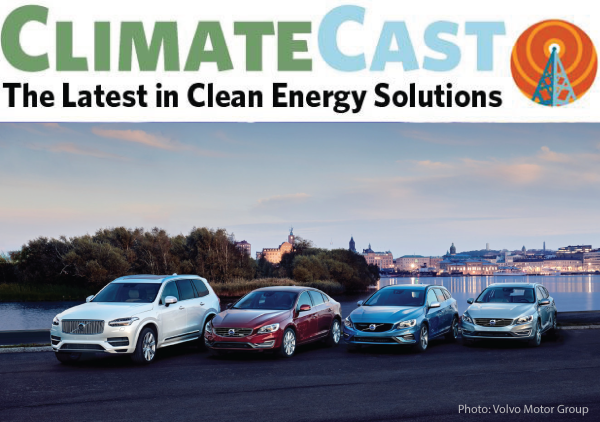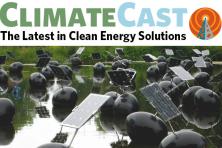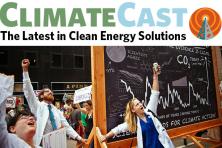Green and growing: Renewables boost US green economy
A new study finds that nearly 9.5 million Americans -- or 4% of the U.S. workforce -- are employed in the “green economy” -- defined as jobs in renewable energy, recycling and waste management, and other “low-carbon” sectors. Clean energy jobs have increased by 20% from 2013-2016, making the renewable energy sector largely responsible for the green economy’s overall growth. The study found that the green economy generates $1.31 trillion in annual revenue, or about 7% of U.S. GDP. The green economy isn’t expected to slow down anytime soon: the International Energy Agency (IEA) reports that clean energy projects are rolling out at their fastest rate in four years, and that renewable electricity is expected to grow by 50% in the next five years. By even the IEA’s most conservative estimates, clean energy is expected to match the output of coal within the next five years. Clean energy is also increasingly powering traditional industries, like steel mills. One of the largest solar farms in the country is set to be built near the Evraz Rocky Mountain Steel Mill in Colorado, making it the first steel mill in the world to have its operations powered predominantly by clean energy. Finally, earlier this month we reported about Virginia’s Governor signing an Executive Order committing the state to 100% carbon-free power by 2050. The state recently indicated its commitment with the governor signing the largest clean energy contract in the U.S. to date.
From London’s famous black cab to the all-American Ford Mustang, what isn’t going electric?
Car manufacturers across the world are ramping up electric vehicle production and beginning to phase out traditional combustible engine vehicles. Volvo just unveiled it first EV and announced it will roll out a new EV model each year through 2025. Ford will offer a “Mustang-inspired” all electric SUV starting next year. Rivian is on a mission to become “the Tesla of trucks”, bringing in over $1.5 billion in investments this year alone to meet production goals. The company plans to fill over 1,000 U.S. jobs by 2024. A taxi company in Madison, Wisconsin is set to become the first all-electric taxicab fleet in the U.S with plans to add Rivian electric trucks to their fleet, as well as passenger shuttles. London’s famous black cab taxis are also going green; about 2,450 hybrid-electric black cabs have been licensed for operation in London. The new hybrid-electric black cabs are part of the City of London’s new emissions standards to reduce air pollution -- air pollution has already dropped by a third since the standards were enacted six months ago. Further EV benefits include new findings that EVs actually have the potential to act as “virtual power plants”, helping utilities soak up midday renewable energy and discharge it in the evenings to reduce peak load. Utilizing EVs for this purpose could result in a potential annual savings of $560 per EV customer.
Exxon on trial for climate fraud
The civil case against Exxon went to court last week, making it the first major climate change lawsuit to reach trial in the U.S. The suit alleges that Exxon misled investors about the financial risks posed by future climate regulations, using two sets of books to inflate the company’s value, defraud investors, and expose them to greater risks. The company is going to great lengths to defend its reputation, recently purchasing Google ads so that individuals searching targeted keywords like "Exxon climate trial," "Exxon knew," and "Exxon climate change” will be directed to the company’s FAQ page rather than news articles or other critical websites. And while some are frustrated that the trial is limited in scope, others are happy to see possible legal action to hold the company accountable. Exxon isn’t the only major oil company currently on trial; The City of Baltimore is suing BP, Shell, Chevron and 26 other oil companies for their role in causing climate change, while states Colorado and Rhode Island are each suing fossil fuel companies for climate damages.
Science is objective, and not influenced by partisan rhetoric
After years of U.S. air pollution decreasing, new data finds U.S. air pollution is on the rise again. Scientists believe a spike in air pollution may have led to as many as 10,000 premature deaths over the past two years. And despite being dismantled by the Trump administration, a panel of former federal epidemiologists and toxicologists held their annual meeting to review air pollution data and offer findings to the public. They warn that current particle pollution standards are not sufficient to safeguard human health, and that the standards must be revised by the EPA.
Scientists also recently examined over 33 El Niños and found that climate change is making the weather pattern stronger. El Niño impacts present differently throughout the world; in some places they trigger drought, while causing flooding and hurricanes elsewhere. In the Pacific Northwest El Niño impacts can appear deceptively mild as they make our winters warmer and wetter. But those warmer winters also lead to decreased snowpack, earlier snowmelt, drought, and dryer forests more vulnerable to wildfire.
Trump versus California, Round 2
In its latest attempt to smack down California, the Trump administration is suing the state over its Cap and Trade program. The lawsuit argues that it's unconstitutional for the Canadian province of Quebec to be a trading partner. If the lawsuit succeeds, it could set a legal precedent for limiting states’ abilities to collaborate with foreign countries on climate policies. In an update on Clean Cars, a federal appeals court has dismissed challenges brought by the state against a Trump administration rule on the tailpipe pollution standards, arguing the case has no merit because the EPA has not yet finalized its rule. The Trump administration also plans to divert water to California farmers even though federal biologists concluded that the plan would drive endangered salmon closer to extinction and could also harm other fish. (When biologists determined that the proposed plan would jeopardize fish, the administration removed the biologists from the project and brought in staff to rewrite their decision.) California has long been called the “frontlines of the states’ resistance” to Trumpism, which is why some speculate that the state has been subject to an endless barrage of attacks from the administration. rule before it's even finalized?
Image

The green economy continues to grow



